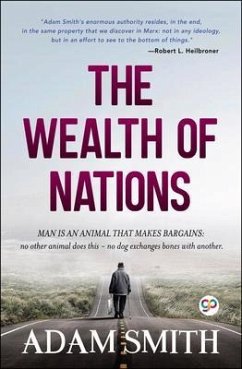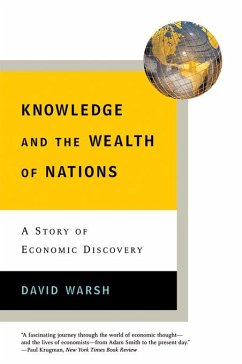
The Wealth of Nations & The Theory of Moral Sentiments (eBook, ePUB)

PAYBACK Punkte
0 °P sammeln!
In his seminal works, "The Wealth of Nations" and "The Theory of Moral Sentiments," Adam Smith masterfully interweaves economics and ethics, setting the foundation for modern capitalism and moral philosophy. "The Wealth of Nations" offers a thorough investigation of commerce and industry, articulating the principles of free market economics, division of labor, and the 'invisible hand' that guides individual pursuits towards collective prosperity. Conversely, "The Theory of Moral Sentiments" explores the complexities of human morality and sympathy, insisting that our moral compass is not just a...
In his seminal works, "The Wealth of Nations" and "The Theory of Moral Sentiments," Adam Smith masterfully interweaves economics and ethics, setting the foundation for modern capitalism and moral philosophy. "The Wealth of Nations" offers a thorough investigation of commerce and industry, articulating the principles of free market economics, division of labor, and the 'invisible hand' that guides individual pursuits towards collective prosperity. Conversely, "The Theory of Moral Sentiments" explores the complexities of human morality and sympathy, insisting that our moral compass is not just a product of self-interest but is deeply interwoven with social relations. Together, these texts reflect Smith's capacity to merge analytical rigor with a nuanced understanding of human nature, situating his ideas in the Enlightenment tradition of inquiry and critical thought. Adam Smith (1723-1790), a philosopher and economist, profoundly influenced Western thought with his beliefs in economic self-regulation and moral philosophy. His intellectual journey encompassed a rich academic background at the University of Glasgow, where he delved into natural philosophy and human behavior. This dual expertise enabled him to articulate the interconnections between ethical considerations and economic practices that remain pertinent to contemporary discourse. For readers seeking a foundational understanding of economic theory and ethical reasoning, Smith's works are indispensable. They offer not merely historical insights but timeless reflections on the interplay between our economic choices and moral imperatives. Engaging with these texts will deepen your comprehension of the forces that shape societies and the ethical frameworks that govern human conduct.
Dieser Download kann aus rechtlichen Gründen nur mit Rechnungsadresse in A, B, BG, CY, CZ, D, DK, EW, E, FIN, F, GR, H, IRL, I, LT, L, LR, M, NL, PL, P, R, S, SLO, SK ausgeliefert werden.













